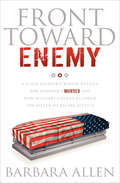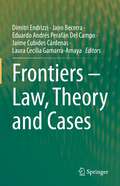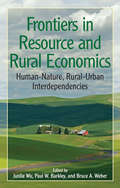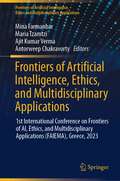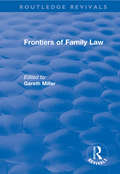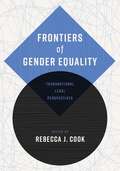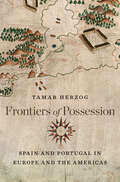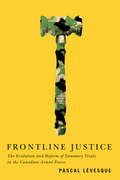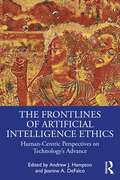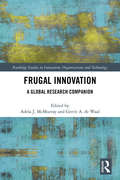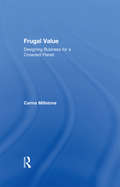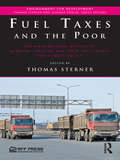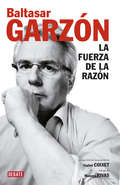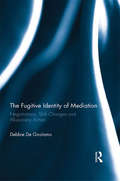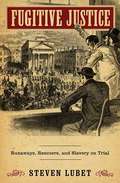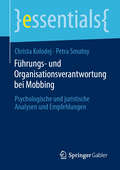- Table View
- List View
Front Toward Enemy: A Slain Soldier's Widow Details Her Husband's Murder and How Military Courts Allowed the Killer to Escape Justice
by Barbara AllenA slain soldier&’s widow details her husband&’s murder by a fellow soldier . . . and exposes how the US military courts allowed the killer to escape justice. June 7, 2005. A sandstorm obscured what light lingered in Iraq&’s nighttime sky as Staff Sergeant Alberto Martinez tied a claymore mine to a window grate. On the other side of the window was Lieutenant Louis Allen, a husband and father of four young boys, and his good friend and Commanding Officer Captain Phillip Esposito, a West Point graduate and father of a baby girl. The men were engaged in a board game, unwinding after a hard day, when without warning the window exploded. More than seven hundred steel ball bearings erupted from the mine and hurtled inward with lethal force, obliterating everything in their kill zone. Martinez was arrested and tried for the murders. But the military judicial system failed, and the killer was set free. How can American soldiers be at risk on their own base, among their fellow soldiers? Could these murders have been prevented? Will it happen again? How can the military&’s judicial system have failed so drastically? What was the government hiding from the slain soldiers&’ families? This book is a personal and factual behind-the-scenes account of a case that is to the military judicial system what the O. J. Simpson case is to the civilian judicial system.
Frontier Democracy
by Silvana R. SiddaliFrontier Democracy examines the debates over state constitutions in the antebellum Northwest (Indiana, Illinois, Iowa, Michigan, Minnesota, Ohio, and Wisconsin) from the 1820s through the 1850s. This is a book about conversations: in particular, the fights and negotiations over the core ideals in the constitutions that brought these frontier communities to life. Silvana R. Siddali argues that the Northwestern debates over representation and citizenship reveal two profound commitments: the first to fair deliberation, and the second to ethical principles based on republicanism, Christianity, and science. Some of these ideas succeeded brilliantly: within forty years, the region became an economic and demographic success story. However, some failed tragically: racial hatred prevailed everywhere in the region, in spite of reformers' passionate arguments for justice, and resulted in disfranchisement and even exclusion for non-white Northwesterners that lasted for generations.
Frontiers – Law, Theory and Cases
by Dimitri Endrizzi Jairo Becerra Eduardo Andrés Perafán Del Campo Jaime Cubides Cárdenas Laura Cecilia Gamarra-AmayaThis book focuses on current frontier-related issues such as humanitarian crises, economic crises, discrimination of migrants in certain countries, different typologies of borders such as land, maritime, air, space, and even cyberspace borders, and environmental protection of water resources at borders. It addresses legal and theoretical considerations and presents empirical cases showing the manifestations of the concept in the real world and its dynamics. Without claiming to exhaust the debate on frontiers, especially given the breadth of the subject and the large number of viewpoints from which the phenomenon can be examined, this book intends to be a helpful source of insights for academics, university students, and others who wish to explore the complex and multifaceted worlds that emerge, particularly in a globalized society, from the interaction between the various actors and scenarios that shape the reality of frontiers.
Frontiers in Resource and Rural Economics: "Human-Nature, Rural-Urban Interdependencies"
by Wu JunJie Paul W Barkley Bruce A WeberMost land in the United States is in rural areas, as are the sources of most of its fresh water and almost all its other natural resources. One of the first books to approach resource economics and rural studies as fundamentally interconnected areas of study, Frontiers in Resource and Rural Economics integrates the work of 18 leading scholars in resource economics, rural economics, rural sociology and political science in order to focus on two complex interdependencies-one pertaining to natural resources and human welfare, the other to urban and rural communities and their economies. The book reviews the past 50 years of scholarship in both natural resource and rural economics. It contrasts their different intellectual and practical approaches and considers how they might be refocused in light of pressing demands on human and natural systems. It then proposes a 'new rural economics' that acknowledges the full range of human-ecosystem and urban-rural interdependencies. It explores the relationship between natural resources and economic growth, and considers the prospects for amenity-driven growth that would benefit both new and traditional inhabitants of rural areas. Later chapters explore the politics of place, spatial economics, strategies for reducing rural poverty, and prospects for linking rural and environmental governance. Throughout, the book emphasizes innovative research methods that integrate natural resource, environmental, and rural economics.
Frontiers of Artificial Intelligence, Ethics, and Multidisciplinary Applications: 1st International Conference on Frontiers of AI, Ethics, and Multidisciplinary Applications (FAIEMA), Greece, 2023 (Frontiers of Artificial Intelligence, Ethics and Multidisciplinary Applications)
by Mina Farmanbar Maria Tzamtzi Ajit Kumar Verma Antorweep ChakravortyThis groundbreaking proceedings volume explores the integration of Artificial Intelligence (AI) across key domains—healthcare, finance, education, robotics, industrial and other engineering applications —unveiling its transformative potential and practical implications. With a multidisciplinary lens, it transcends technical aspects, fostering a comprehensive understanding while bridging theory and practice. Approaching the subject matter with depth, the book combines theoretical foundations with real-world case studies, empowering researchers, professionals, and enthusiasts with the knowledge and tools to effectively harness AI. Encompassing diverse AI topics—machine learning, natural language processing, computer vision, data analytics and supervisory control — the volume showcases state-of-the-art techniques propelling AI advancements. Structured into four parts: Part 1: Artificial Intelligence (AI), explores evolving deep neural networks, reinforcement learning, and explainable AI, providing a deep dive into the technical foundations of AI advancements. Part 2: Robotics and Control Systems, delves into the integration of AI in robotics and automatic control, addressing supervisory control, automated robotic movement coordination, anomaly detection, dynamic programming, and fault tolerance, offering insights into the evolving landscape of intelligent automation. Part 3: AI and Society, examines the societal impact of AI through chapters on ethical considerations, economic growth, environmental engagements, and hazard management, providing a holistic perspective on AI's role in shaping society. Part 4: PhD Symposium, presents the future of AI through cutting-edge research, covering legal and ethical dimensions, privacy considerations, and computationally efficient solutions, offering a glimpse into the next generation of AI advancements. Catering to a diverse audience—from industry leaders to students—the volume consolidates the expertise of renowned professionals, serving as a comprehensive resource for navigating the ever-evolving AI landscape. An essential reference for those staying at the forefront of AI developments.
Frontiers of Family Law
by Gareth MillerThis title was first published in 2003. The essays in this collection are written by academics and practitioners who look at some of the key aspects of family law. Papers include one from Lord Justice Ward, who gave the first judgement in the Court of Appeal on the case of the conjoined twins from Malta, another from Judge Pearl who has been responsible for training the judiciary on the impact of the Human Rights Act on family law, while Dr C. Ball contributes a paper on aspects of the 1989 Children Act. Parent and child contact across borders is dealt with in a paper by William Duncan, who is Deputy Director General of the Hague Conference. Other topics include medical evidence in child cases, pre-nuptial agreements and the re-establishing of contact after divorce.
Frontiers of Gender Equality: Transnational Legal Perspectives (Pennsylvania Studies in Human Rights)
by Rebecca J. CookIn Frontiers of Gender Equality, editor Rebecca Cook enlarges the chorus of voices to introduce new and different discourses about the wrongs of gender discrimination and to explain the multiple dimensions of gender equality. This volume demonstrates that the wrongs of discrimination can best be understood from the perspective of the discriminated, and that gender discrimination persists and grows in new and different contexts, widening the gap between the principle of gender equality and its realization, particularly for subgroups of women and LGBTQ+ peoples.Frontiers of Gender Equality provides retrospective views of the struggles to eliminate gender discrimination in national courts and international human rights treaties. Focusing on gender equality enables comparisons and contrasts among these regimes to better understand how they reinforce gender equality norms. Different regional and international treaties are examined, those in the forefront of advancing gender equality, those that are promising but little known, and those whose focus includes economic, social, and cultural rights, to explore why some struggles were successful and others less so. The book illustrates how gender discrimination continues to be normalized and camouflaged, and how it intersects with other axes of subordination, such as indigeneity, religion, and poverty, to create new forms of intersectional discrimination.With the benefit of hindsight, the book’s contributors reconstruct gender equalities in concrete situations. Given the increasingly porous exchanges between domestic and international law, various national, regional, and international decisions and texts are examined to determine how better to breathe life into equality from the perspectives, for instance, of Indigenous and Muslim women, those who were violated sexually and physically, and those needing access to necessary health care, including abortion. The conclusion suggests areas of future research, including how to translate the concept of intersectionality into normative and institutional settings, which will assist in promoting the goals of gender equality.
Frontiers of Justice: Disability, Nationality, Species Membership
by Martha C. Nussbaumgeneral and the timeless. Yet such theories, addressing the world and its problems, must respond to the real and changing dilemmas of the day. A brilliant work of practical philosophy, Frontiers of Justice is dedicated to this proposition. Taking up three urgent problems of social justice neglected by current theories and thus harder to tackle in practical terms and everyday life, Martha Nussbaum seeks a theory of social justice that can guide us to a richer, more responsive approach to social cooperation.<P><P> The idea of the social contract--especially as developed in the work of John Rawls--is one of the most powerful approaches to social justice in the Western tradition. But as Nussbaum demonstrates, even Rawls's theory, suggesting a contract for mutual advantage among approximate equals, cannot address questions of social justice posed by unequal parties. How, for instance, can we extend the equal rights of citizenship--education, health care, political rights and liberties--to those with physical and mental disabilities? How can we extend justice and dignified life conditions to all citizens of the world? And how, finally, can we bring our treatment of nonhuman animals into our notions of social justice? Exploring the limitations of the social contract in these three areas, Nussbaum devises an alternative theory based on the idea of "capabilities." She helps us to think more clearly about the purposes of political cooperation and the nature of political principles--and to look to a future of greater justice for all.
Frontiers of Possession: Spain and Portugal in Europe and the Americas
by Tamar HerzogA “lucid” analysis of the territorial formation of Spain and Portugal in both Europe and the Americas (Publishers Weekly).Frontiers of Possession asks how territorial borders were established in Europe and the Americas during the early modern period and challenges the standard view that national boundaries are largely determined by military conflicts and treaties. Focusing on Spanish and Portuguese claims in the New and Old Worlds, Tamar Herzog reconstructs the different ways land rights were negotiated and enforced, sometimes violently, among people who remembered old possessions or envisioned new ones: farmers and nobles, clergymen and missionaries, settlers and indigenous peoples.Questioning the habitual narrative that sees the Americas as a logical extension of the Old World, Herzog portrays Spain and Portugal on both sides of the Atlantic as one unified imperial space. She begins in the Americas, where Iberian conquerors had to decide who could settle the land, who could harvest fruit and cut timber, and who had river rights for travel and trade. The presence of indigenous peoples as enemies to vanquish or allies to befriend, along with the vastness of the land, complicated the picture, as did the promise of unlimited wealth. In Europe, meanwhile, the formation and re-formation of boundaries could last centuries, as ancient entitlements clashed with evolving economic conditions and changing political views and juridical doctrines regarding how land could be acquired and maintained.Herzog demonstrates that the same fundamental questions had to be addressed in Europe and in the Americas. Territorial control was always subject to negotiation, as neighbors and outsiders, in their quotidian interactions, carved out and defended new frontiers of possession.Praise for Frontiers of Possession“Herzog succeeds in her aim of moving beyond the usually separate histories of Spain and Portugal—and of Europe and the Americas—to complicate the accepted understanding of national and imperial boundaries as immutable facts rather than as ongoing sites of contestation.” —William O’Connor, The Daily Beast“This book is about as thorough a research work as this reviewer has ever encountered . . . This is a truly innovative and well-documented interpretation of this topic.” —D. L. Tengwall, Choice“The best account we now have of the long legal and political rivalry between the world’s first modern imperial powers.” —Anthony Pagden, author of The Enlightenment and Why It Still Matters
Frontiers of Real Estate Science in Japan (New Frontiers in Regional Science: Asian Perspectives #29)
by Yoshiro Higano Yasushi Asami Hideo FukuiThis open access book presents recent research and hot topics in the field of real estate science in Japan. It features carefully selected English translations of peer-reviewed papers and excellent articles published in the Japanese Journal of Real Estate Sciences, as well as papers presented at the Japan Association of Real Estate Sciences (JARES) annual conference. The topics covered include market analyses of vacant houses, policies for reuse of vacant houses, property tax policy, issues of land for which the owners are unknown, disaster and real estate values, the siting optimization plan and its influence on real estate, big data and ICT technology for the real estate business, and public real estate management.Real estate science in Japan has developed in step with international research in the fields of law and economics, regional science, civil engineering, environmental science, architectonics, and related areas. At the same time, it has evolved into a unique discipline that focuses on policy-oriented practical science with arguments for the reform of outdated laws, regulations, and traditional customs. Asian countries are currently growing rapidly and are catching up with developing countries. The lessons learned and know-how accumulated by JARES is helpful for practitioners and policymakers not only in Japan, but also in other Asian countries.
Frontline Justice: The Evolution and Reform of Summary Trials in the Canadian Armed Forces (Human Dimensions in Foreign Policy, Military Studies, and Security Studies #7)
by Pascal LévesqueCompared with its civilian counterpart – which struggles with delays and uncertain results – summary military justice is efficient. From offence until outcome, 90 per cent of cases are dealt with in less than ninety days. The other side of the coin is that there is no right to representation by defence counsel, no transcript produced, and no appeal to a judge. Nine times out of ten, individuals are found guilty. For service members, consequences can include fines, reductions in rank, confinement, and sentences of up to thirty days in military jail, sometimes with a criminal conviction. Addressing important gaps in legal literature, Frontline Justice sets out to examine summary justice in Canada's military and to advocate for reform. Pascal Lévesque describes the origins, purposes, and features of the summary trial system in the Canadian Armed Forces. He then analyzes the system's benefits and flaws and the challenges it faces in maintaining discipline while respecting the Canadian Charter of Rights and Freedoms. Lévesque determines that troubling aspects of the system, including the fact that lower and higher ranks are dealt with and punished differently, are clear indicators of a need for change. Criticizing current legislation, the book takes into account the latest developments in military law and jurisprudence to make concrete recommendations for an alternative model of military justice. A thought-provoking and balanced analysis, Frontline Justice seeks to remedy some of the more unfair and arcane proceedings of the Canadian military's summary trial system.
Frontline Justice: The Evolution and Reform of Summary Trials in the Canadian Armed Forces (Human Dimensions in Foreign Policy, Military Studies, and Security Studies)
by Pascal LévesqueCompared with its civilian counterpart - which struggles with delays and uncertain results - summary military justice is efficient. From offence until outcome, 90 per cent of cases are dealt with in less than ninety days. The other side of the coin is that there is no right to representation by defence counsel, no transcript produced, and no appeal to a judge. Nine times out of ten, individuals are found guilty. For service members, consequences can include fines, reductions in rank, confinement, and sentences of up to thirty days in military jail, sometimes with a criminal conviction. Addressing important gaps in legal literature, Frontline Justice sets out to examine summary justice in Canada's military and to advocate for reform. Pascal Lévesque describes the origins, purposes, and features of the summary trial system in the Canadian Armed Forces. He then analyzes the system's benefits and flaws and the challenges it faces in maintaining discipline while respecting the Canadian Charter of Rights and Freedoms. Lévesque determines that troubling aspects of the system, including the fact that lower and higher ranks are dealt with and punished differently, are clear indicators of a need for change. Criticizing current legislation, the book takes into account the latest developments in military law and jurisprudence to make concrete recommendations for an alternative model of military justice. A thought-provoking and balanced analysis, Frontline Justice seeks to remedy some of the more unfair and arcane proceedings of the Canadian military's summary trial system.
The Frontlines of Artificial Intelligence Ethics: Human-Centric Perspectives on Technology's Advance
by Andrew J. HamptonThis foundational text examines the intersection of AI, psychology, and ethics, laying the groundwork for the importance of ethical considerations in the design and implementation of technologically supported education, decision support, and leadership training. AI already affects our lives profoundly, in ways both mundane and sensational, obvious and opaque. Much academic and industrial effort has considered the implications of this AI revolution from technical and economic perspectives, but the more personal, humanistic impact of these changes has often been relegated to anecdotal evidence in service to a broader frame of reference. Offering a unique perspective on the emerging social relationships between people and AI agents and systems, Hampton and DeFalco present cutting-edge research from leading academics, professionals, and policy standards advocates on the psychological impact of the AI revolution. Structured into three parts, the book explores the history of data science, technology in education, and combatting machine learning bias, as well as future directions for the emerging field, bringing the research into the active consideration of those in positions of authority. Exploring how AI can support expert, creative, and ethical decision making in both people and virtual human agents, this is essential reading for students, researchers, and professionals in AI, psychology, ethics, engineering education, and leadership, particularly military leadership.
Frost/Nixon: Behind the Scenes of the Nixon Interviews
by David Frost Bob ZelnickThe British journalist recounts his 1977 interview with the disgraced American president—the basis for the Tony Award–winning play & Oscar-nominated film.In Frost/Nixon, Sir David Frost tells the extraordinary story of how he pursued and landed the biggest fish of his career—and how the series drew larger audiences than any news interview ever had in the United States, before being shown all over the world.This is Frost’s absorbing story of his pursuit of Richard Nixon, and is no less revealing of his own toughness and pertinacity than of the ex-President’s elusiveness. Frost’s encounters with such figures as Swifty Lazar, Ron Ziegler, potential sponsors, and Nixon as negotiator are nothing short of hilarious, and his insight into the taping of the programs themselves is fascinating.Frost/Nixon provides the authoritative account of the only public trial that Nixon would ever have, and a revelation of the man’s character as it appeared in the stress of eleven grueling sessions before the cameras. Including historical perspective and transcripts of the edited interviews, this is the story of Sir David Frost’s quest to produce one of the most dramatic pieces of television ever broadcast, described by commentators at the time as “a catharsis” for the American people.
Frugal Innovation: A Global Research Companion (Routledge Studies in Innovation, Organizations and Technology)
by Adela J. McMurray Gerrit A. De WaalCustomers are increasingly seeking "low-cost, high-quality" or what is known as frugal products that meet the buyer’s needs while reducing the associated cost of ownership. This book examines the developing principles and theories of frugal innovations across the globe. The authors identify frugal innovation (FI) using a multi-method approach to data analysis. They argue that the concept of frugality as a societal/ethical value has undergone several changes and propose a differentiated model of frugal innovations. They address frugal innovations that have never been accessible to the public. Hands-on case studies across multiple industry sectors and countries, supported by theory, provide multiple learning opportunities. The authors explore the relationship between FI and digitalization and technology, and discuss how FI can be applied in the context of contemporary issues such as food security. Further, they articulate the mechanisms by which FI beliefs and values can be incorporated into organizational culture. The final chapters address both ethical and controversial views of frugal innovation. The book is a valuable resource for students in business courses, for industry professionals wanting to improve their triple bottom line, and for educators wanting to influence and change the mind-sets of the younger generations to effectively deal with today’s and tomorrow’s challenges.
Frugal Value: Designing Business for a Crowded Planet
by Carina MillstoneWe live in unprecedented times. Climate change and ecosystem collapse are altering our world beyond recognition, and a growing global population is exacerbating the pressure on the resources that power our economies. How should the private sector respond to the new risks and uncertainties of our Crowded Planet? Frugal Value contests the notion that companies can rise to the great challenges of our time by adopting so-called 'sustainable business' practices. Instead, the acute ecological crisis requires an all-round rethink of what business does, and how it does it. This book explores what business responsibility looks like today, and how it could be put into practice through far-reaching changes to companies, ranging from new approaches to product design and business models to reconfiguration of operations and innovative ownership structures. Frugal Value provides practitioners and scholars with the perspective and tools they need to design companies that help drive the socio-economic changes so urgently required for a sustainable and just world.
Fuel Taxes and the Poor: The Distributional Effects of Gasoline Taxation and Their Implications for Climate Policy (Environment For Development Ser.)
by Thomas SternerFuel Taxes and the Poor challenges the conventional wisdom that gasoline taxation, an important and much-debated instrument of climate policy, has a disproportionately detrimental effect on poor people. Increased fuel taxes carry the potential to mitigate carbon emissions, reduce congestion, and improve local urban environment. As such, higher gasoline taxes could prove to be a fundamental part of any climate action plan. However, they have been resisted by powerful lobbies that have persuaded people that increased fuel taxation would be regressive. Reporting on examples of over two dozen countries, this book sets out to empirically investigate this claim. The authors conclude that while there may be some slight regressivity in some high-income countries, as a general rule, fuel taxation is a progressive policy particularly in low income countries. Rich countries can correct for regressivity by cutting back on other taxes that adversely affect poor people, or by spending more money on services for the poor. Meanwhile, in low-income countries, poor people spend a very small share of their money on fuel for transport. Some costs from fuel taxes may be passed on to poor people through more expensive public transportation and food transport. Nevertheless, in general the authors find that gasoline taxes become more progressive as the income of the country in question decreases. This book provides strong arguments for the proponents of environmental taxation. It has immediate policy implications at the intersection of multiple subject areas, including transportation, environmental regulation, development studies, and climate change. Published with Environment for Development initiative.
La fuerza de la razón
by Baltasar GarzónUna larga entrevista del gran escritor gallego Manuel Rivas a Baltasar Garzón sobre el acoso que ha padecido y que le ha acabado expulsando de la Audiencia Nacional. Este libro es el resultado de un ofrecimiento, una colaboración y un deseo. Isabel Coixet se ofreció a filmar un documental, Manuel Rivas accedió a colaborar y Baltasar Garzón quiso hablar por primera vez de la situación por la que estaba pasando, y de toda su trayectoria. Al presentar esa entrevista, ampliada y actualizada, La fuerza de la razón es un documento fundamental para entender la historia reciente de la justicia en España, desde la operación Nécora al caso Gürtel, pasando por la liberación de Ortega Lara o la detención de Pinochet, y para comprender el modelo de justicia que se pretende imponer y por qué se quiere apartar de su labor a una de las figuras más destacadas de la España democrática. «Creo que la fuerza de la razón, frente a la razón de la fuerza, siempre debe imponerse sobre cualquier tentación de los que disponiendo del poder, lo utilizan arbitrariamente.»
The Fugitive Identity of Mediation: Negotiations, Shift Changes and Allusionary Action
by Debbie De GirolamoDespite much having been written about what mediation is, direct observations of commercial mediations are limited. This book grants an opportunity to observe mediation in action and also provides external commentary about the actions observed. The book approaches Mediation ethnographically as a social process that is informed by structures, rules and norms that colour the environment within which it operates. Through the ethnographic method, a process leading to negotiated order is examined, baring its elements, identifying its influences and studying the movement to order. The result is the reconceptualization of mediation. The mediator is invited into the negotiation as third party intervener. He creates the process of mediation, defining the process by his actions, which ultimately merges mediator with process. This book provides a window to the lived experience of participants to mediation: it explores their understandings of and interactions within a process they have experienced together and demonstrates how mediation is a process inextricably linked to negotiation. The Fugitive Identity of Mediation will be of interest to scholars, mediators, parties who participate in the process, and to those active in public policy discourse.
Fugitive Justice: Runaways, Rescuers, and Slavery On Trial
by Steven LubetDuring the tumultuous decade before the Civil War, no issue was more divisive than the pursuit and return of fugitive slaves—a practice enforced under the Fugitive Slave Act of 1850. When free Blacks and their abolitionist allies intervened, prosecutions and trials inevitably followed. These cases involved high legal, political, and—most of all—human drama, with runaways desperate for freedom, their defenders seeking recourse to a “higher law” and normally fair-minded judges (even some opposed to slavery) considering the disposition of human beings as property.
Führen mit Herz: Mit dem edlen achtfachen Pfad achtsamer und nachhaltiger werden
by Joan MarquesDieses aufschlussreiche und inspirierende Buch zeigt sowohl erfahrenen als auch angehenden Führungskräften, wie sie sich buddhistische Philosophien zunutze machen können, um eine effektivere und nachhaltigere Führung zu praktizieren. Illustriert durch die Geschichten visionärer und innovativer Führungskräfte aus vielen Bereichen, darunter Elon Musk (Tesla), Malala Yousafzai (Menschenrechte), Howard Schultz (Starbucks) und Muhammad Yunus (Mikrofinanzierung und Entwicklung), verbindet dieser Band ein uraltes buddhistisches Konzept, bekannt als der Edle Achtfache Pfad, mit den Bedürfnissen der heutigen Zeit, um ein alternatives Paradigma zur übermäßigen Fokussierung auf das Ergebnis und den "Winner-take-all"-Ansatz zu entwickeln, der die Führungspraxis der letzten Jahrzehnte dominiert hat.Die verblüffende Ablehnung der Europäischen Union durch das Vereinigte Königreich und das spaltende US-Präsidentschaftsrennen 2016 dienen als dramatische Kulisse für komplexe gesellschaftliche Probleme, die kreative Lösungen erfordern, die Akteure aus verschiedenen Bereichen und Sichtweisen zusammenbringen. Der Achtfache Pfad – charakterisiert durch die Elemente Rechte Sichtweise, Rechte Absicht, Rechte Rede, Rechtes Handeln, Rechter Lebensunterhalt, Rechte Anstrengung, Rechte Achtsamkeit und Rechte Konzentration – ist ein Führungsansatz, der individuelle und kollektive Belange ausgleicht sowie pragmatische und spirituelle Prioritäten in Einklang bringt.Joan Marques, eine erfahrene Autorin, Rednerin und Ausbilderin zum Thema Spiritualität in Organisationen mit umfangreicher Erfahrung in der Lehre und Anwendung buddhistischer Prinzipien, zeigt auf, wie der Achtfache Pfad Praktiken und Entscheidungen beeinflussen kann, die zu langfristigen Vorteilen für die Gemeinschaft führen und dabei achtsamere und gewissenhaftere Führungskräfte entwickeln, die in der Lage sind, vielschichtige Herausforderungen zu bewältigen.Die Übersetzung wurde mit Hilfe von künstlicher Intelligenz durchgeführt. Eine anschließende menschliche Überarbeitung erfolgte vor allem in Bezug auf den Inhalt.
Führung im öffentlichen Dienst: Konzepte und Instrumente für Führungskräfte im öffentlichen Sektor – worauf es in der Praxis ankommt (Edition Innovative Verwaltung)
by Dino André SchubertDieses Buch vermittelt Methoden und Werkzeuge, die für engagierte Führungskräfte im öffentlichen Dienst hilfreich und wirksam sind. Gerade in der öffentlichen Verwaltung, in der „die Uhren anders ticken“, scheint effektive Führung und Management eine besondere Herausforderung zu sein. Zudem ist der Glaubenssatz „das war schon immer so“ stark – vielleicht zu stark – etabliert. Wer jedoch den Anspruch hat, effektiv führen zu wollen, darf sich damit nicht zufriedengeben.Dr. Dino André kombiniert seine Erfahrungen in der öffentlichen Verwaltung mit den Erkenntnissen der Wissenschaft zu den Themen Führung und Management. Er stellt zunächst die wissenschaftlich überprüften Konzepte, die es für „gute Führung“ braucht, zur Verfügung. Im zweiten Schritt gibt er praktische Handreichungen in Form von Methoden und Konzepten für eine erfolgreiche Führungsarbeit im öffentlichen Dienst. Als Führungskraft erhalten Sie mit diesem Buch ein wertvolles Fundament, das Ihnen Sicherheit sowie Handlungsoptionen in mitunter schwierigen Führungsfragen gibt. Die vorgestellten Konzepte sind allesamt evidenz-basiert, lassen sich also wissenschaftlich belegen. Damit unterscheiden sie sich wohltuend von so einigen „Mainstream-Ansätzen“, die durch die Führungsetagen geistern.Führung in der Praxis – darauf kommt es anAufgaben und Rollen einer FührungskraftDer Nutzen von Führungsstilen und etablierten Werkzeugen Erfolg durch ArbeitszufriedenheitAbgrenzung zwischen Leitungs- und SachbearbeitungsaufgabeDie Performance im GremiumDie Rolle im PersonalmanagementKann man im öffentlichen Dienst keine Mitarbeiter entlassen?
Führung in der Polizei
by Christian Barthel Dirk HeidemannDas Herausgeberwerk ist ein Plädoyer für eine organisationssoziologisch fundierte Führungskonzeption, die am Beispiel der Polizei wichtige Ansätze bündelt und ihre Brauchbarkeit in theoretischer wie praktischer Hinsicht dokumentiert. Die Polizei ist ein interessantes Feld, um Probleme der Führung zu diskutieren, weil sie durch vergleichsweise steile Hierarchien gekennzeichnet ist und dennoch komplexe Führungssituationen aufweist, die durch die Hierarchie selbst kaum bearbeitet werden können. Außerdem verfügt die Polizei über ein offizielles Führungssystem, das "Kooperative Führungssystem" (KFS), das als Leitbild und als "verbindliche Handlungsorientierung" Geltung beansprucht. Das KFS stammt aus den 1970er-Jahren und ist geprägt von den instrumentellen Lösungsansätzen, die einerseits auf klassische Motivationsansätze, aber auch auf eine unreflektierte Vorgesetztenfunktion zurückgreifen, die man als heroisch und in heutiger Zeit kaum mehr realistisch bezeichnen muss. Die Autoren präsentieren verschiedene organisationssoziologische Ansätze, um deutlich zu machen, dass eine angemessene Rekonstruktion des Führungsprozesses nicht nur im Sinne eines erweiterten theoretischen Blickwinkels, sondern auch für die Bearbeitung komplexer Führungssituationen praktisch brauchbarer ist.
Führung in Verwaltung und Polizei: Eine soziologisch informierte Ermutigung
by Christian BarthelDieses Fachbuch hilft dabei, die komplexe und oft anstrengende Wirklichkeit des Führungsalltags und theoretisches soziologisches Wissen in ein ausbalanciertes Verhältnis zu bringen. Zunächst werden die organisationssoziologischen Grundlagen einer Theorie der Führung beschrieben, dann wird die praktische Arbeit der Führung im Organisationsalltag der Verwaltung fokussiert. Dies geschieht unter dem Gesichtspunkt des Managements kritischer Führungssituationen. Deutlich wird dabei, dass die durchgehende Aufmerksamkeit für kritische Situationen nicht als punktuelle Reparaturarbeit missverstanden werden darf, sondern als der systematische Weg zu einer prozesshaften Dienststellenentwicklung verstanden werden muss. Außerdem wird der Blick auf die Führungsinteraktion im engeren Sinne gewendet – also auf die Personalführung, aber auch auf die gleichermaßen relevanten Interaktionen mit ebenengleichen Kollegen, Vorgesetzten oder externen Anspruchsgruppen bzw. Kooperationspartnern. Schließlich wird das Selbstmanagement der Novizen im Höheren Dienst in ihrer neuen Führungsrolle beleuchtet.Der Autor nutzt seine persönlichen Erfahrungen als Führungspraktiker und als Dozent für Führungslehre und verdichtet und reflektiert sie für „Aufsteiger“ vor allem in den Höheren Dienst der allgemeinen Verwaltung sowie der Polizei aus organisationssoziologischer Sicht.
Führungs- und Organisationsverantwortung bei Mobbing: Psychologische und juristische Analysen und Empfehlungen (essentials)
by Christa Kolodej Petra SmutnyChrista Kolodej und Petra Smutny zeigen Handlungsmöglichkeiten für Führungskräfte und Personalverantwortliche bei Mobbing in ihrem Einflussbereich auf. Mobbing wird als kontextbezogenes Phänomen vorgestellt, welches spezifische macht-, gruppen- und rollendynamische Prozesse aufweist. Es werden sowohl aus psychologischer als auch aus juristischer Sicht relevante Interventionen verdeutlicht. Das Buch wird mit praktischen Präventions- und Interventionstipps für Führungskräfte abgerundet, die aus Best-Practice-Beispielen von Führungskräften abgeleitet wurden.Die Autorinnen:Prof. Dr. Dr. Christa Kolodej, MA ist Pionierin der österreichischen Mobbingforschung und leitet seit 20 Jahren das Zentrum für Konflikt- und Mobbingberatung in Wien. Sie coacht Führungskräfte und Personalverantwortliche und unterstützt Unternehmen bei der Implementierung von Konfliktmanagementsystemen. Maga Petra Smutny, LL.M, ist Rechtsanwältin und eingetragene Mediatorin in Wien, Österreich, und beschäftigte sich als Richterin, Vorsitzende der Gleichbehandlungskommission und Autorin seit vielen Jahren mit den Themen Mobbing, Antidiskriminierung und Führungsverhalten.
